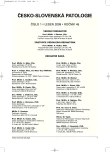-
Medical journals
- Career
Analysis of the Tracheal Contents Using Headspace Gas Chromatography-mass Spectrometry to Screen for Accelerant Use
Authors: Nobuyuki Adachi * **; Hiroshi Kinoshita *; Minori Nishiguchi *; Motonori Takahashi *; Harumi Ouchi *; Takako Minami *; Kiyoshi Matsui *; Takehiko Yamamura *; Hiroyuki Motomura ***; Nao Ohtsu *; Shie Yoshida *; Kiyoshi Ameno ****; Shigeru Hishida *
Authors‘ workplace: Department of Legal Medicine, Hyogo College of Medicine, 1-1 Mukogawa-cho, Nishinomiya, Hyogo, 663-8501, Japan *; Joint –Use Research facilities, Hyogo College of Medicine, 1-1 Mukogawa-cho, Nishinomiya, Hyogo, 663-8501, Japan **; Forensic Science Laboratory, Hyogo Prefectural Police Headquarters, 4-1, Shimoyamate -dori 5-chome, Chuo-ku, Kobe, 650-8510, Japan ***; Department of Forensic Medicine, Faculty of Medicine, Kagawa University, 1750-1 Ikenobe, Miki, Kita, Kagawa, 761-0793, Japan ****
Published in: Soud Lék., 54, 2009, No. 1, p. 2-3
Overview
We describe here the usefulness of analysis of tracheal contents in a case of death by fire, which revealed that the deceased had used the accelerants. The analysis of tracheal contents provides useful information for the determination of the circumstances of the scene.
Key words:
burning – accelerants, gas chromatography – mass spectrometry – alipathic hydrocarbons
Sources
1 . Takayasu, T., Ohshima, T., Kondo, T., Sato, Y.: Intratracheal gas analysis for volatile substances by gas chromatography/ mass spectrometry - application to forensic autopsies. J Forensic Sci 2001; 46 : 98–104.
2. Takatori, T.: Gas chromatographic determination of kerosene components from cadaveric hypopharyngeal contents. Hokkaido Igaku Zasshi. 1980; 55 : 471–3.
3. Yoshida, M., Watabiki, T., Tokiyasu, T., Akane, A., Ishida, N.: Case of death by fire with kerosene - Analysis of contents of trachea and stomach-. Nihon Hoigaku Zasshi. 1994; 48 : 96–104.
4. Morinaga, M., Kashimura, S., Hara, K., Hieda, Y., Kageura, M.: The utility of volatile hydrocarbon analysis in cases of carbon monoxide poisoning. Int J Legal Med 1996; 109 : 75–79.
5. Matsubar, K., Akane, A., Takahashi, S., Shiono, H., Fukui, Y., Kagawa, M., Maseda, C.: Gas chromatographic determination for forensic purposes of petroleum fuel inhalated just before fatal burning. J Chromatogr, 1988; 424 : 49–59.
6. Japanese Society of Legal Medicine Forensic Toxicology Working Group (ed). Kerosene and gasoline. In: Manual for Forensic Toxicology Analysis of the Japanese Society of Legal Medicine, Tokyo: Japanese Society of Legal Medicine, 2006, pp. 111–112.
7. Kinoshita, H., Nishiguchi, M., Kasuda, S., Ouchi, H., Minami, T., Matsui, K., Yamamura, T., Motomura, H., Ohtsu N., Yoshida, S., Adachi, N., Aoki, Y., Nagasaki, Y., Ameno, K., Hishida, S.: An autopsy case of poisoning with ethanol and psychotropic drugs. Soud Lek 2008; 53 : 16–17.
8. Pharmaceutical Society of Japan (ed). Carbon monoxide. In: Standard methods of chemical analysis in poisoning – with commentary – (4th ed.) Tokyo: Nanzando, 1992, pp. 57–68.
9. Seto, Y.: Determination of volatile substances in biological samples by headspace gas chromatography. J Chromatogr A 1994; 674 : 25–62.
10. Takayasu, T, Kondo, T.: Components of gasoline and kerosene. In: Suzuki O, Watanabe K. editors. Drugs and poisons in humans. A handbook of practical analysis. Berlin Heidelberg: Springer-Verlag, 2005, pp. 159–169.
Labels
Anatomical pathology Forensic medical examiner Toxicology
Article was published inForensic Medicine

2009 Issue 1
Most read in this issue- Shotgun Injury – Multiple Pellets
- The Utilization of Tachymetry in Forensic Medicine
- Analysis of the Tracheal Contents Using Headspace Gas Chromatography-mass Spectrometry to Screen for Accelerant Use
Login#ADS_BOTTOM_SCRIPTS#Forgotten passwordEnter the email address that you registered with. We will send you instructions on how to set a new password.
- Career

